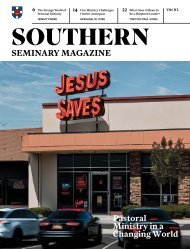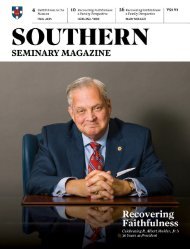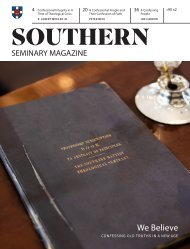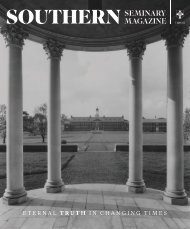Southern Seminary Magazine (Vol 90.1) The Light of Truth: Apologetics in the 21st Century
You also want an ePaper? Increase the reach of your titles
YUMPU automatically turns print PDFs into web optimized ePapers that Google loves.
seek<strong>in</strong>g <strong>the</strong> historical adam<br />
himself (see Mat<strong>the</strong>w 19:1–10) did <strong>in</strong>deed believe Adam<br />
to be historical.<br />
Inerrancy Compromised,<br />
Orig<strong>in</strong>al S<strong>in</strong> Scuttled<br />
Such Christians argue that Jesus’ and Paul’s mistaken belief<br />
about <strong>the</strong> historicity <strong>of</strong> Adam does not affect <strong>the</strong> <strong>the</strong>ology<br />
<strong>of</strong> <strong>the</strong> po<strong>in</strong>t be<strong>in</strong>g made by <strong>the</strong> story <strong>of</strong> Adam concern<strong>in</strong>g<br />
human s<strong>in</strong>, judgment, and redemption. However, this raises<br />
an entirely new problem. <strong>The</strong> <strong>in</strong>spiration <strong>of</strong> Scripture as<br />
<strong>the</strong> word <strong>of</strong> God (2 Tim. 3:16–17) and <strong>the</strong> trustworth<strong>in</strong>ess<br />
<strong>of</strong> Jesus as God <strong>the</strong> Son who speaks <strong>the</strong> word <strong>of</strong> God (John<br />
3:34) is dramatically underm<strong>in</strong>ed by this argument. If Jesus<br />
and Paul affirmed as historical that which is not historical,<br />
<strong>the</strong>n <strong>the</strong> word <strong>of</strong> God communicates as true that<br />
which is false. Thus, a denial <strong>of</strong> <strong>the</strong> historicity <strong>of</strong> Adam<br />
requires a radical retool<strong>in</strong>g <strong>of</strong> <strong>the</strong> traditional doctr<strong>in</strong>e <strong>of</strong><br />
<strong>the</strong> <strong>in</strong>spiration <strong>of</strong> Scripture and a denial <strong>of</strong> <strong>the</strong> <strong>in</strong>errancy<br />
<strong>of</strong> Scripture, a fact that those who reject <strong>the</strong> historicity <strong>of</strong><br />
Adam are will<strong>in</strong>g to admit.<br />
Ano<strong>the</strong>r problem with deny<strong>in</strong>g <strong>the</strong> historicity <strong>of</strong> Adam<br />
while affirm<strong>in</strong>g <strong>the</strong> <strong>the</strong>ological claims made <strong>in</strong> <strong>the</strong> New<br />
Testament about him has to do with <strong>the</strong> endur<strong>in</strong>g effect<br />
<strong>of</strong> <strong>the</strong> s<strong>in</strong> <strong>of</strong> Adam and Eve. <strong>The</strong> <strong>the</strong>ological po<strong>in</strong>t be<strong>in</strong>g<br />
made by Paul through his allusion to Adam is not only<br />
<strong>the</strong> fact that Jesus succeeds where Adam failed but that all<br />
<strong>of</strong> humanity is condemned and corrupted on account <strong>of</strong><br />
Adam’s s<strong>in</strong>. Paul is explicit that all <strong>of</strong> humanity is under<br />
condemnation and corruption because <strong>of</strong> <strong>the</strong> s<strong>in</strong> <strong>of</strong> <strong>the</strong><br />
first man (Rom. 5:12–19). If Adam is merely a literary<br />
figure (whe<strong>the</strong>r believed by Paul to be historical or not),<br />
<strong>the</strong>re can be no explanation for how <strong>the</strong> s<strong>in</strong> <strong>of</strong> a literary<br />
character <strong>in</strong> a myth can have consequences for people <strong>in</strong><br />
<strong>the</strong> real world. Thus, a denial <strong>of</strong> <strong>the</strong> historicity <strong>of</strong> Adam<br />
would completely undo <strong>the</strong> historic and very important<br />
Christian doctr<strong>in</strong>e <strong>of</strong> orig<strong>in</strong>al s<strong>in</strong>.<br />
Christian Interpretations <strong>of</strong> <strong>the</strong><br />
Early Chapters <strong>of</strong> Genesis<br />
Among Christians committed to <strong>the</strong> historical existence<br />
<strong>of</strong> Adam and Eve as progenitors <strong>of</strong> <strong>the</strong> human race along<br />
with such traditional Christian doctr<strong>in</strong>es as <strong>the</strong> typological<br />
l<strong>in</strong>k between Adam as primal covenant failure and Christ<br />
as Redeemer, <strong>the</strong> <strong>in</strong>spiration and <strong>in</strong>errancy <strong>of</strong> Scripture as<br />
<strong>the</strong> word <strong>of</strong> God, and <strong>the</strong> doctr<strong>in</strong>e <strong>of</strong> orig<strong>in</strong>al s<strong>in</strong>, <strong>the</strong>re<br />
are many different <strong>in</strong>terpretive strategies for <strong>the</strong> first few<br />
chapters <strong>of</strong> Genesis.<br />
Each view below is quite complex and nuanced, and proponents<br />
have <strong>of</strong>fered extensive treatments to defend <strong>the</strong><br />
views. <strong>The</strong> descriptions below are necessarily described<br />
broadly, focus<strong>in</strong>g exclusively on <strong>the</strong> view’s handl<strong>in</strong>g <strong>of</strong> <strong>the</strong><br />
historicity <strong>of</strong> Adam.<br />
“If Adam is merely<br />
a literary figure<br />
(whe<strong>the</strong>r believed by<br />
Paul to be historical<br />
or not), <strong>the</strong>re can be no<br />
explanation for how<br />
<strong>the</strong> s<strong>in</strong> <strong>of</strong> a literary<br />
character <strong>in</strong> a myth<br />
can have consequences<br />
for people<br />
<strong>in</strong> <strong>the</strong> real world.”<br />
1Genesis 1–11 as Mythical. Some Christians take for<br />
granted <strong>the</strong> claim that biological diversity on earth<br />
is <strong>the</strong> result <strong>of</strong> a long process <strong>of</strong> macro-evolution by<br />
which all known species <strong>of</strong> life today evolved from<br />
o<strong>the</strong>r life forms such that all liv<strong>in</strong>g th<strong>in</strong>gs share a common<br />
descent. A commitment to such an understand<strong>in</strong>g <strong>of</strong> biological<br />
life rules out <strong>the</strong> possibility that <strong>the</strong> open<strong>in</strong>g chapters<br />
<strong>of</strong> Genesis are to be <strong>in</strong>terpreted as historical narrative.<br />
Such Christians usually see <strong>the</strong> open<strong>in</strong>g chapters <strong>of</strong> Genesis<br />
(<strong>of</strong>ten <strong>the</strong> first 11) as bear<strong>in</strong>g <strong>the</strong> character <strong>of</strong> “myth”<br />
<strong>in</strong> <strong>the</strong> sense <strong>of</strong> non-historical primaeval stories that function<br />
to expla<strong>in</strong> why life <strong>in</strong> <strong>the</strong> world is <strong>the</strong> way that it is.<br />
Typically, such <strong>in</strong>terpreters want to preserve <strong>the</strong> historical<br />
existence <strong>of</strong> Adam and Eve (and perhaps <strong>the</strong> o<strong>the</strong>r characters<br />
<strong>in</strong> <strong>the</strong> narrative) without affirm<strong>in</strong>g <strong>the</strong> details <strong>of</strong> <strong>the</strong><br />
story. Along <strong>the</strong>se l<strong>in</strong>es, William Lane Craig uses <strong>the</strong> term<br />
mytho-history to describe <strong>the</strong> genre <strong>of</strong> Genesis 1–11. 3<br />
O<strong>the</strong>rs have used different terms to make similar po<strong>in</strong>ts.<br />
Such <strong>in</strong>terpreters should be commended for <strong>in</strong>sist<strong>in</strong>g<br />
on <strong>the</strong> historical existence <strong>of</strong> Adam and Eve, but <strong>the</strong> designation<br />
<strong>of</strong> Genesis 1–11 as mytho-history is fraught with<br />
problems. Despite protests to <strong>the</strong> contrary, <strong>the</strong>re is noth<strong>in</strong>g<br />
14 <strong>the</strong> sou<strong>the</strong>rn baptist <strong>the</strong>ological sem<strong>in</strong>ary






